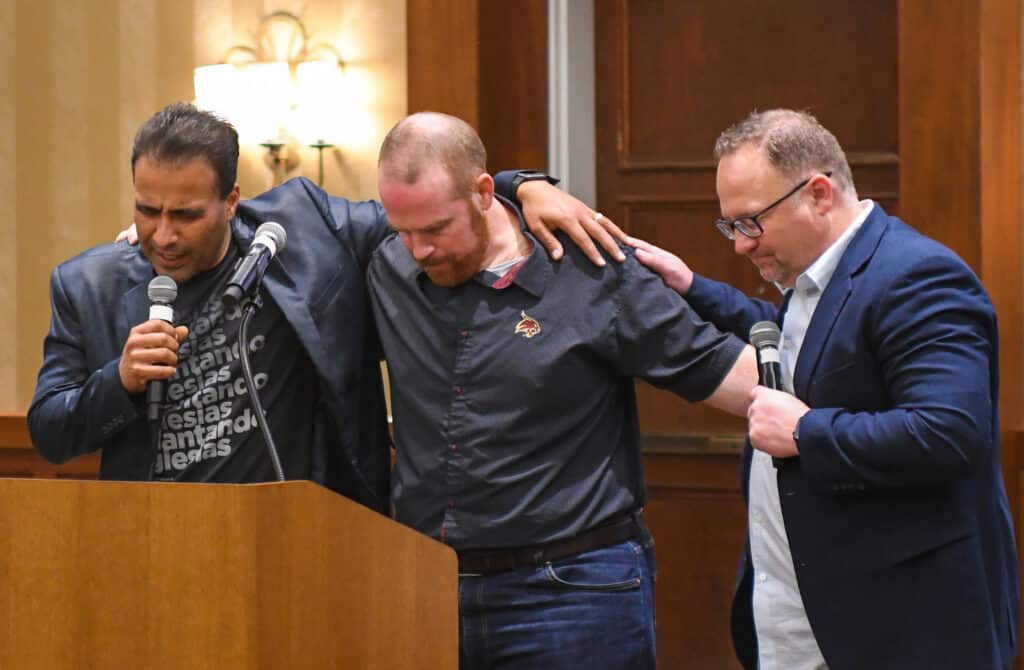The music of Texas is as extensive as the state—a chorus of voices transitioning from English to Spanish to Vietnamese all with one twist of the radio dial. What is foreign to one person’s ear is the sweet sounds of home to another and, for yet another, a reminder of Jesus’s commission to make disciples of all nations.
Southern Baptists of Texas Convention church planters recognize that the world is moving to Texas and are working to stay ahead of the cultural curve that is redefining the state’s neighborhoods and communities. Churches that minister in a person’s “heart language,” or native language—there are 126 languages spoken in the Lone Star State—are key to reaching such diverse communities.
For first-generation immigrants, hearing the gospel in their own language can be music to their ears. And being able to worship with the familiar chords, melodies and instruments of their homelands is music to their hearts.
“Music is its own language,” said Larry Tardy, founder of Equip Worship. Tardy’s ministry began in 2012 as a conference for Texas church worship ministers. He was asked to duplicate the conference in Vancouver, British Columbia, where a friend had been working as a church planter. Of the 80 churches represented at the conference only 40 had music leaders.
“Immediately, my heart was burdened,” Tardy said.
His ministry, supported in part by the North American Mission Board to reach its Send Cities, teaches professionalism, not performance, to would-be worship leaders, emphasizing that worship with music should be grounded in Scripture. Upon that foundation, Tardy teaches leaders the technical and musical elements of worship ministry.
Before there is even the first strains of a music ministry, ethnically stylized strains of music can be used to “pre- evangelize,” said Milton Lites, a retired International Mission Board missionary who served 34 years in Asia and Latin America.
“It would be like learning their language,” he said. “It’s a bridge.”
In the field Lites taught music and directed a variety of choral and orchestral groups. Although he has not been involved in missions outreach to immigrants in the United States, Lites said the concept of using music to draw people to the gospel message would not be too different than overseas.
Using “heart music” can open doors for evangelists seeking entry into the community of a specific people or language group.
“It lets them know you are familiar with their culture and that you care about their culture,” Lites said.
While preaching in an immigrant group’s heart language is effective, adding music can have a powerful impact. For example, Lites suggested, if he and other patients were seated in a doctor’s waiting room and he began speaking to the group, only some might pay attention.
“But if you start singing, everybody will listen,” he said.
Tardy recommended pursuing first-generation immigrants, as they are hungry for the things of home. Couching the gospel message in word and song of a specific language serves to draw the attention of unbelievers as well as encourage immigrants who brought their Christian faith with them from home.
Tardy and Lites both have witnessed international congregations slogging through English-language hymns, focusing on word pronunciation instead of word proclamation. But once the music changed to that of their native language, “the energy of the worship experience was full and there was a lot of joy as they sang,” Tardy said.
“Just like evangelism and preaching in the heart language of the people, however, it will inevitably limit who will be attracted. But, in a sense, that is the point,” said Terry Coy, retired director of missions with the SBTC. “Communicating the gospel in words or music in the heart language of the people is inherently limiting; it is to ‘attract’ those of that language who might otherwise not be reached.”
Subsequent generations of immigrant families may share, in part, the heart language and can participate in the worship services inaugurated by their parents. But as the third and fourth generations use more English and less of their grandparents’ language, churches must adjust to accommodate the dual heart languages of their growing congregations.
There is sometimes a bit of God-ordained serendipity when using heart music evangelism. It reaches people who, back home, shared only a common language. During a Vancouver church service, an immigrant church member pointed to another member and told Tardy, “At home we are enemies. But in Vancouver we are in church together.”














